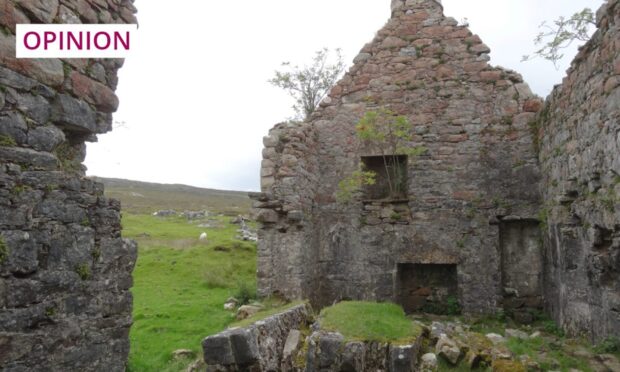There’s been a good deal said about the so-called “New Highland Clearances” lately, and a visit to the “remote” Gàidhealtachd (well, to Fort William, anyway) by the (Glasgow) Herald to highlight some of the current issues facing folk in the Highlands and islands.
Now, the issues are considerable, from lack of affordable housing to an increasingly ageing population, though I would hesitate to call the outward-migration of young native people a modern Highland Clearance.
Inflated land and housing prices have become a scourge everywhere, and especially here in the perceived “wild, remote” Highlands.
Daily TV travel programmes and an endless number of newspaper and social media outlets wax lyrical about the unmatched beauty of the area. Who would not be attracted by the image of a red-roofed cottage beneath the Cuillin in Skye while stuck on a motorway somewhere south of Carlisle?
Covid, with its mass permission (at least for middle-class folk) to work from home amplified the problem. Desk-based work could as well be done in an all-singing, all-dancing online bothy in a bonny Highland glen (there are indeed such places for those who can afford them) as in an office in Hampstead.
Pity, though, for those who can’t do their work on their computers at a desk: nurses who have to be physically on the wards, bus and train and delivery and lorry and gritter drivers who have to be behind the wheel, shop workers who have to be stacking the shelves, teachers who have to be in school, care workers who have to physically dress and feed and nurse their clients.
Not everyone has the privilege of being able to “work from home”. Or be retired with a good nest egg from the profit from selling a house down south.
The consequence is that local people are increasingly priced out of homes in their native land. It’s a scandal which needs to be addressed at a national political level, though I won’t hold my breath on that one, given the neoliberal consensus that rules in Holyrood and Westminster.
London meets Luskentyre
For nigh on 100 years (since the Crofters Holding Act of 1886), the tenant-and-tenure system of crofting acted as a bulwark against land and housing speculation, until its deliberate and now increasingly rapid disintegration. That began in the 1970s, when (under a Labour government) owner-occupation was eased in, giving “the market” a foot across the threshold. The market-force merchants are now sitting very comfortably, and profitably, by the peat fire.
Isn’t that what rampant capitalism is all about? Not a poor milch cow in the heather, but a profitable view of the Minch?
Crofts are now sold on the open market for hundreds of thousands of pounds – not so that homesteaders can rear cattle and sheep and pigs and horses, and grow wheat and barley and potatoes, but so that Grand Designs-type houses can be built on them, with a fine view of the sea or the mountains.
Isn’t that what rampant capitalism is all about? Not a poor milch cow in the heather, but a profitable view of the Minch?
So, here we are: London meets Luskentyre, or something like that.
It’s not a new Highland Clearance
Nevertheless, let’s not over-egg the porridge. Young folk (my own children included) can’t afford to live on their native heath; between the highest bidders, second homes and Airbnb properties, there’s nothing left for them.
So, there are fewer young people to go to the local school or church or hall or to play with the sports team. Fewer work-age people to do the necessary work; who will look after all these older people who now, disproportionately, make up the demographic of our communities?
But – it’s not a new Highland Clearance. Oh, I realise that dispossession can take many forms, but still I haven’t (as yet, anyway) seen a Patrick Sellar figure riding through the Highland glens on his white horse with a flame about to set fire to homes. Nor have I heard a wailing like the geologist Professor Archibald Geikie did in Strath, Skye in 1852, when he witnessed these poor Gaels physically cleared from their homes:
“A strange wailing sound reached my ears… I could see a long and motley procession winding along the road that led north from Suisnish… There were old men and women, too feeble to walk, who were placed in carts; the younger members of the community on foot were carrying their bundles of clothes… while the children, with looks of alarm, walked alongside…
“A cry of grief went up to heaven, the long plaintive wail, like a funeral coronach, was resumed… the sound re-echoed through the wide valley of Strath in one prolonged note of desolation.”
I realise you don’t have to experience that brutality to be “cleared”. But let’s be realistic in our use of language. The solution is political, not emotional. Otherwise, we’re in danger of being that lad who shouted daily that the wolf was coming. So often that folk stopped believing him. Until it happened.
Angus Peter Campbell is an award-winning writer and actor from Uist



Conversation